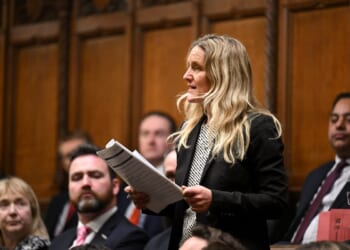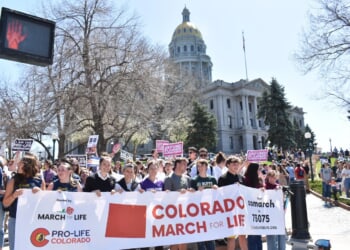Owen Webster is a Trainee Solicitor in conveyancing and a Conservative Party activist from the West Midlands.
Over nine months have passed since the Conservative Party’s 2024 election defeat, ending 14 years in power. Following Rishi Sunak’s resignation, Kemi Badenoch emerged as the party’s leader.
Prior to her election, the Conservative Party was riding the opposition wave. Their polling numbers had improved, and it looked somewhat promising for the party in opposition.
The Labour lead had dropped to 3.6 per cent, down from the 10.3 per cent lead they achieved in the 2024 election, whilst the Conservative vote share had risen slightly, from 24.4 per cent in 2024 to 25.3 per cent on the day Badenoch assumed office.
What followed seemed promising: the Labour lead had collapsed even further, with their lead shrinking to a mere 0.6 per cent. The Conservative Party was now polling three per cent above their 2024 performance – on track to nearly double their seat numbers to 248.
However, the party’s fortunes have reversed since Badenoch’s leadership began. Their polling numbers have dropped to 21.6 per cent, trailing both Reform and Labour. From an early bounce in support, their numbers have steadily declined, and their average seat total stood recently at 137, only slightly up from the 121 they currently hold. So, what went wrong?”
Badenoch had one problem: she lacked policy. Her ‘Renewal 2030’ pitch, launched on 2 September 2024, which was intended to discuss “the future of our party, our politics, and our country,” set out her five principles: Personal Responsibility, Citizenship, Equality Under the Law, Family, and Truth.
She mentioned the need for turning “principles… into action,” touched on the issue that “politicians pretend that we can have everything,” and criticised how politicians often “make promises they cannot keep”. Declaring that a renewed Conservative Party was “vital” to ensure the renewal of both Britain at home and “its position in the world,” she said that she was “Labour’s worst nightmare”, boasting that she knew the weak spots of the Labour Party and understood that they lacked principles.
However, Labour’s worst nightmare now seems to be Reform, which, for much of February and early March, outpolled it on average.
Faced with threats from both the right and the left, Badenoch needed to build on the opposition wave she inherited and clearly communicate who she was and what she stood for.
Yet she has made little progress with the general public, with 55 per cent believing she is not a ‘prime minister in waiting’, and falls short when the public is asked the ‘preferred prime minister’ question, trailing Sir Keir Starmer and Sir Ed Davey, while being tied with Nigel Farage.
Faced with threats from both the right and the left, Badenoch needed to build on the opposition wave she inherited and clearly communicate who she was and what she stood for. Yet he public remains uncertain. There have to datet been slow dribbles of policy released by the Party, and Badenoch has struggled to communicate even those effectively.
As a result, she has so far failed to capitalise on the momentum she inherited as leader whilst also not pivoting effectively to a new direction; as of today, the Conservative Party of 2025 is seen as the same party the public rejected in 2024.
By no means is all lost. If Badenoch can focus on clearly articulating a detailed policy vision and a fresh direction for the party, there may still be time for a turnaround.
Currently, five important issues are facing the electorate: the economy, immigration, health, defence, and crime. So far, the Conservatives have announced a policy for just one of those: immigration.
Declaring that the system introduced by the government in which she served was “broken”, and promising to cap the number of immigrants coming to the UK, is promising. But it invites hard questions about how the Party ended up doing the opposite of what it promised when in office – questions it has so far refused to confront. In light of that, its anaemic polling is no surprise.
Moreover, the slow pace of policy development limits scope for attacking Labour, because it leaves no answer to the question ‘What would you do differently?’
For example, recent ONS figures show that the economy shrank in January by 0.1 per cent, and the most that the opposition produced was a sarcastic post congratulating the government for shrinking the economy.
The public don’t need anyone to tell them Labour is running the economy badly; the subject is likely to weigh only more heavily on voters’ minds, especially as the cost of living crisis deepens. What they do need, if they are to consider returning the Conservatives to office, is a clear idea of what our ministers would do instead.
In the absence of such a vision, who can blame them for flirting with the minor parties? The country gave us a big majority in 2019, and Labour an historic one last year. If neither worked, what have they god to lose?
Badenoch has just 16 days until the local elections, and recent polling indicates that the Conservative Party is on track to lose nearly 400 councillors, with Reform gaining over 400.
The Conservatives need an answer to both Reform and Labour, but have yet to provide one. To salvage the Party’s future, let alone that of her own leadership, Badenoch must become the threat to both Starmer and Farage that she promised party members she would be last September.




![Jasmine Crockett Justifies Mass Illegal Immigration With Bizarre Argument [WATCH]](https://www.right2024.com/wp-content/uploads/2025/03/1742007023_Jasmine-Crockett-Justifies-Mass-Illegal-Immigration-With-Bizarre-Argument-WATCH-350x250.jpg)
![Red Sox Fan Makes the ‘Catch of the Day’ with Unconventional ‘Glove’ [WATCH]](https://www.right2024.com/wp-content/uploads/2025/04/Red-Sox-Fan-Makes-the-‘Catch-of-the-Day-with-350x250.jpg)

![NYC Tourist Helicopter Falls into Hudson River, Siemens Executive and Family Among Those Killed [WATCH]](https://www.right2024.com/wp-content/uploads/2025/04/NYC-Tourist-Helicopter-Falls-into-Hudson-River-Siemens-Executive-and-350x250.jpg)








